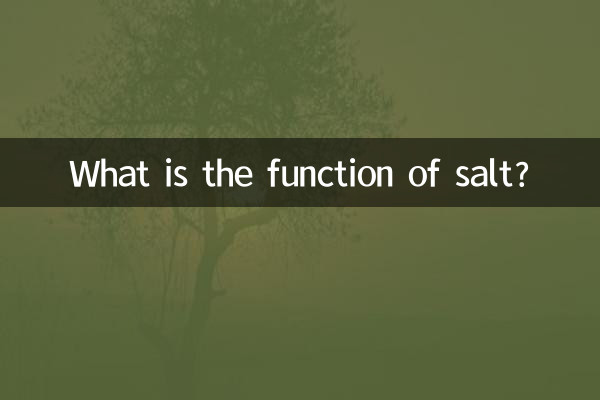What is the function of salt?
Salt, as an indispensable condiment in daily life, not only adds flavor to food, but also plays an important role in health, industry, environmental protection and other fields. This article will combine the hot topics and hot content on the Internet in the past 10 days, structure the multiple functions of salt, and attach relevant data for reference.
1. The role of salt in diet and health

Salt (sodium chloride) is one of the necessary electrolytes for the human body and is involved in physiological functions such as body fluid balance, nerve conduction, and muscle contraction. The following are its main functions:
| Function category | Specific performance | Related data |
|---|---|---|
| Seasoning function | Enhance food flavor and balance sweet, sour, bitter and other flavors | The global per capita annual salt intake is about 9-12 grams (WHO recommends 5 grams) |
| Nutritional supplements | Provide sodium ions to maintain extracellular fluid osmotic pressure | Adults need 2300mg of sodium per day (about 5.75g of salt) |
| Antiseptic effect | Inhibit bacterial growth and extend food shelf life | The salt concentration of pickled foods needs to be ≥15% to effectively prevent corrosion. |
2. Uses of salt in industry and technology
Among recent hot topics, the application of salt in the fields of new energy and environmental protection has attracted much attention:
| Application areas | Specific use | hotspot association |
|---|---|---|
| energy storage technology | Application of molten salt energy storage in solar power generation | The global molten salt energy storage market size will reach US$1.23 billion in 2023 |
| Chemical raw materials | Production of basic chemicals such as chlorine and sodium hydroxide | Accounts for more than 60% of global salt consumption |
| Environmentally friendly snow removal | Main ingredients of winter road snow melting agent | Annual consumption of snow removal salt in North America exceeds 20 million tons |
3. Salt Controversy and Health Advice
Hot discussions in the health field in the past 10 days have focused on the "salt reduction action":
1.Risks of a high-salt diet: Excessive intake may lead to high blood pressure (systolic blood pressure increases by 5mmHg for every 2.5g of salt added per day), cardiovascular disease, etc.
2.Global Salt Reduction Policy: The United Kingdom has passed food industry reforms and per capita salt intake has dropped by 15% within 8 years; China's "Three Reductions and Three Health" special actions continue to advance.
3.alternative: Low sodium salt (containing 25%-30% potassium chloride) can reduce the risk, but people with renal insufficiency should use it with caution.
4. Interesting trivia: the cultural significance of salt
1.historical currency: In ancient Rome, soldiers' salaries (Salarium) were paid in salt, which gave rise to the word "Salary".
2.folk symbols: In Japan, salt is sprinkled in sumo wrestling arenas to ward off evil spirits, and in the Middle East, salt is used to represent eternal contracts.
3.Frontier of science and technology: Salt caverns are used as underground gas storage, and a single salt cavern can store 3 billion cubic feet of natural gas.
5. Suggestions on the rational use of salt
| crowd | recommended daily amount | Things to note |
|---|---|---|
| healthy adult | ≤5g (about one beer bottle cap) | Pay attention to invisible salt (soy sauce, snacks, etc.) |
| Hypertensive patients | 3-4 grams | It is recommended to use low sodium salt |
| athlete | 6-8 grams (during high-temperature training) | Need to supplement electrolyte drinks |
From the above structured analysis, it can be seen that the role of salt is far more than just seasoning. While enjoying the convenience it brings, we should understand scientifically and use this white crystal rationally to achieve a balanced development of modern life and health.

check the details

check the details